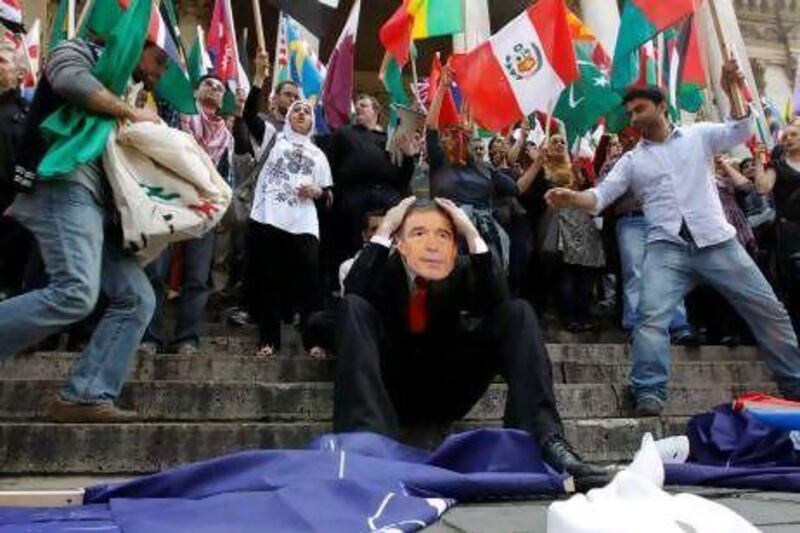BRUSSELS // The US president is expected to give details of his strategy in Afghanistan after international troops leave in 2014 when a Nato summit convenes in Chicago today.
Barack Obama faces increasing reluctance from cash-strapped Europe to provide long-term funding for the Afghan armed forces that are to take over.
Many Europeans doubt that Afghanistan will grow into a safe and stable nation, said Sven Mikser, the former Estonian defence minister and rapporteur on Afghanistan for the Nato Parliamentary Assembly, which is the link between Nato and the parliaments of member states.
"Certainly there is quite strong scepticism in some quarters as to the effectiveness, especially of the Afghan national government and its institutions," Mr Mikser said on Friday.
He supports a long-term European commitment to Afghanistan but is in a minority in a Europe that from the start saw the battle there as an American war.
The new French president, Francois Hollande, has talked about accelerating the withdrawal of his country's troops. France has roughly 3,900 troops in the country and Nicolas Sarkosy, Mr Hollande's predecessor, had planned to pull out 1,200 of them this year.
Germany has announced it will reduce the number of its troops from 5,350 to 4,400 by 2013 and remove the remainder by 2014.
Mr Mikser has highlighted the dangers of Europe's Afghanistan sEuotrategy in a report that has yet to be adopted by the Assembly.
"Allied governments should seriously consider the potential implications and risks of a minimal commitment," he writes.
The main form this commitment will take is a 10-year agreement for the post-2014 period between Nato and Afghanistan that is to be finalised in Chicago.
The bulk of the agreement concerns supporting the Afghan armed forces financially, which has been estimated at US$4.1 billion (Dh15bn) a year for a 230,000-strong Afghan army. This is down from the initially planned force of 350,000 that would have cost $7bn yearly.
The US is expected to provide up to half of the total, with some other countries outside Europe, notably Japan and Australia, also contributing hefty sums.
The commitment being asked of the European countries is $1bn and the expectation is that this goal will be met - but rather reluctantly.
"It is a lot cheaper to support the Afghan national forces than it is to have more than 100,000 foreign troops in the country," said Mr Mikser.
Jan Techau, director of Carnegie Europe, the Brussels-based foreign policy forum of the Carnegie Endowment for International Peace, concurred but with a very strong caveat: "The Europeans will come up with the money but I don't know for how long they'll come up with the money." He is grim about the European will to remain committed to Afghanistan. "I don't think the Europeans have any kind of sense you can achieve something major there," he said.
While Europe was never very keen on the war, the main shift came when the mission appeared to change, said Mr Techau.
"When the Afghanistan mission switched from beating Al Qaeda and the Taliban and it switched from a simple military rationale to a nation-building rationale, basically Nato had set itself an unrealistic goal," he said.
For now, the European countries will not want to upset the US and damage Nato. But in the long term, things may change, in part because of the dire economic situation on the continent.
"The economic pressures always play a role but that has not really had a major impact so far, although it may change," said Mr Techau.
Much will also depend on what actually happens in Afghanistan after the Nato and US withdrawal in 2014. A total collapse of the state would obviously obviate the need for any further contributions. But there are many in-between scenarios. Al Qaeda could return to the country, in which case different rules may again apply.
Nato's minimal goal in Afghanistan has been to make sure Al Qaeda cannot use it as a base of operations again, said Ian Davis, who heads the Nato Watch, an NGO that looks at issues such as at transparency, human rights and democratic representation in Nato.
And even that objective is in doubt, he said, adding: "The outcomes don't look good."
The Americans partly have themselves to blame for the Europeans' reluctance, he said, as the US has always treated Afghanistan as their conflict.
"All the key decisions down the line have come from the White House, not from Brussels," he said.
[ foreign.desk@thenational.ae ]
Follow
The National
on
[ @TheNationalUAE ]
& Ferry Biedermann on
[ @ferrybiedermann ]





